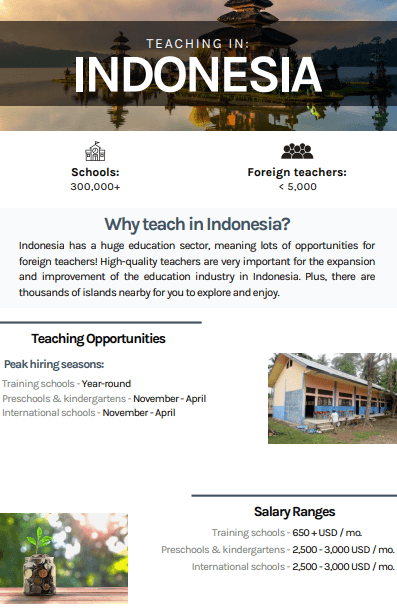Teach English in Indonesia
Indonesia offers great travel opportunities and fantastic students!
Why teach abroad in Indonesia?
Indonesia is the largest country in Southeast Asia – made up of a staggering 17,508 islands. Most of the teaching opportunities in Indonesia can be found in Jakarta, which is located on the northwest coast of Java, an island that’s toward the center of the Indonesian islands. Teaching English in Indonesia has gotten increasingly more popular as the years have gone by due to many factors such as the stunning terrain, diverse wildlife, and welcoming people.
Indonesian students are known for being eager learners, as well as curious about Western pop-culture and music. The Indonesian government is pushing for higher quality education, as it leads to economic growth. English language education often goes hand-in-hand with what is considered to be a high-quality education, as English is the language of business around the world. Therefore, English teachers are in high-demand throughout Indonesia, meaning there are many opportunities for foreign teachers there.
Overview
Requirements to teach in Indonesia:
- Hold a Bachelor’s degree
- 5+ years of teaching experience for K-12
- No experience required for training schools
- Native English speaker
Average monthly pay in Indonesia:
$2000 – $3000 USD
This varies based on experience, hours worked, and the type of school that you work in.
Cost of living per month in Indonesia:
$1400 – $3000 USD
This varies by lifestyle and city that you choose to live in.
The education sector in Indonesia
Just like anywhere else in the world, students’ temperaments and attitudes will vary vastly. That being said, you’ll work with some great students that are interested in learning, and you’ll quickly figure out which activities and lessons keep their attention and spark engagement.
Education is highly valued in Indonesia, and learning English is an important part of the education system. Teachers must have 5+ years of teaching experience prior to working in K-12 schools in Indonesia, which makes a big difference for students and their families.
However, the education system in Indonesia needs a lot of work, and government officials are trying to bring in more foreign teachers to help bring it up to par. Access to education has been made easier, but the quality of it still has a long way to go to meet Indonesia’s goals.
Curriculums used in Indonesia
The most popular curriculums used in Indonesia are IB, Local/Mixed International, Cambridge IGCSE, and the National Curriculum for England. If you have experience teaching any of these or are interested in teaching them, then teaching in Indonesia might be for you! Indonesian schools are always on the lookout for both beginner and experienced teachers, so there are great teaching opportunities for everyone.

Teaching IB in Indonesia
As of 2020, there are 57 schools in Indonesia that use the IB curriculum. This equates to hundreds of IB teaching positions, many of which are available to foreign teachers. Learn more about teaching IB in Indonesia, and check out the history and an overview of teaching IB abroad in our blog.
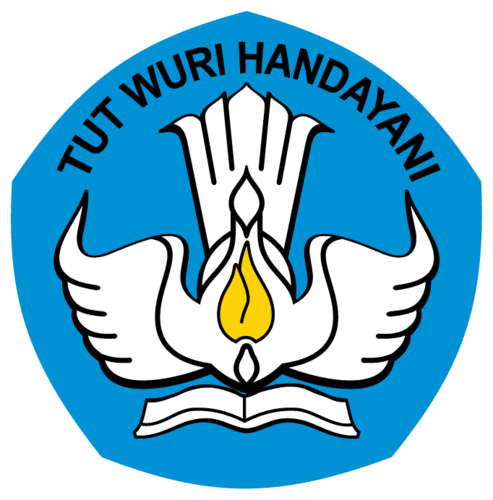
Teaching the Local/Mixed International Curriculum in Indonesia
Indonesia’s school system is well developed and managed by the Ministry of Education & Culture. Unlike many of its Southeast Asian neighbors, private schools in Indonesia make up nearly half of all schools. The curriculum is made of standard subjects along with Pancasila (philosophy of Indonesia), religion, as well as both the Indonesian & English languages.
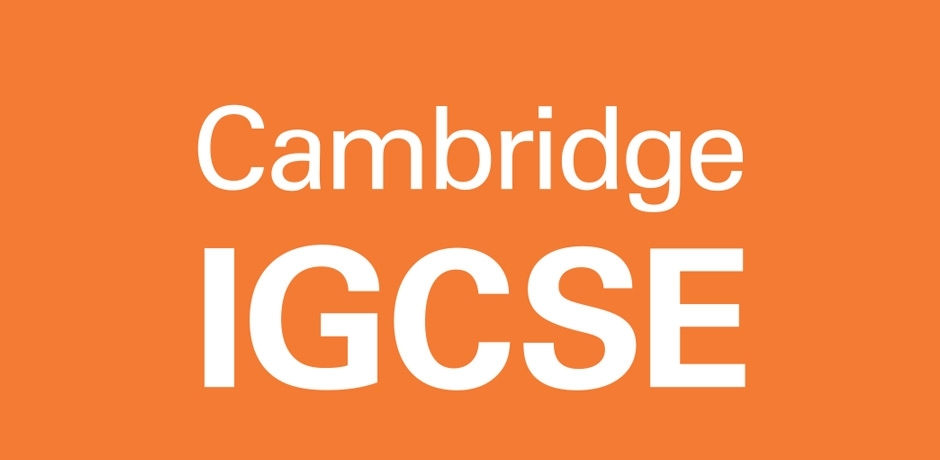
Teaching Cambridge IGCSE in Indonesia
There are a variety of schools across Indonesia that offer the Cambridge IGCSE curriculum. There are over 70 subjects that can be taught using this curriculum, and schools can offer them in any combination that they prefer.
If you want to teach a curriculum that has an international outlook but also retains local relevancy, then teaching Cambridge IGCSE in Indonesia might be for you!
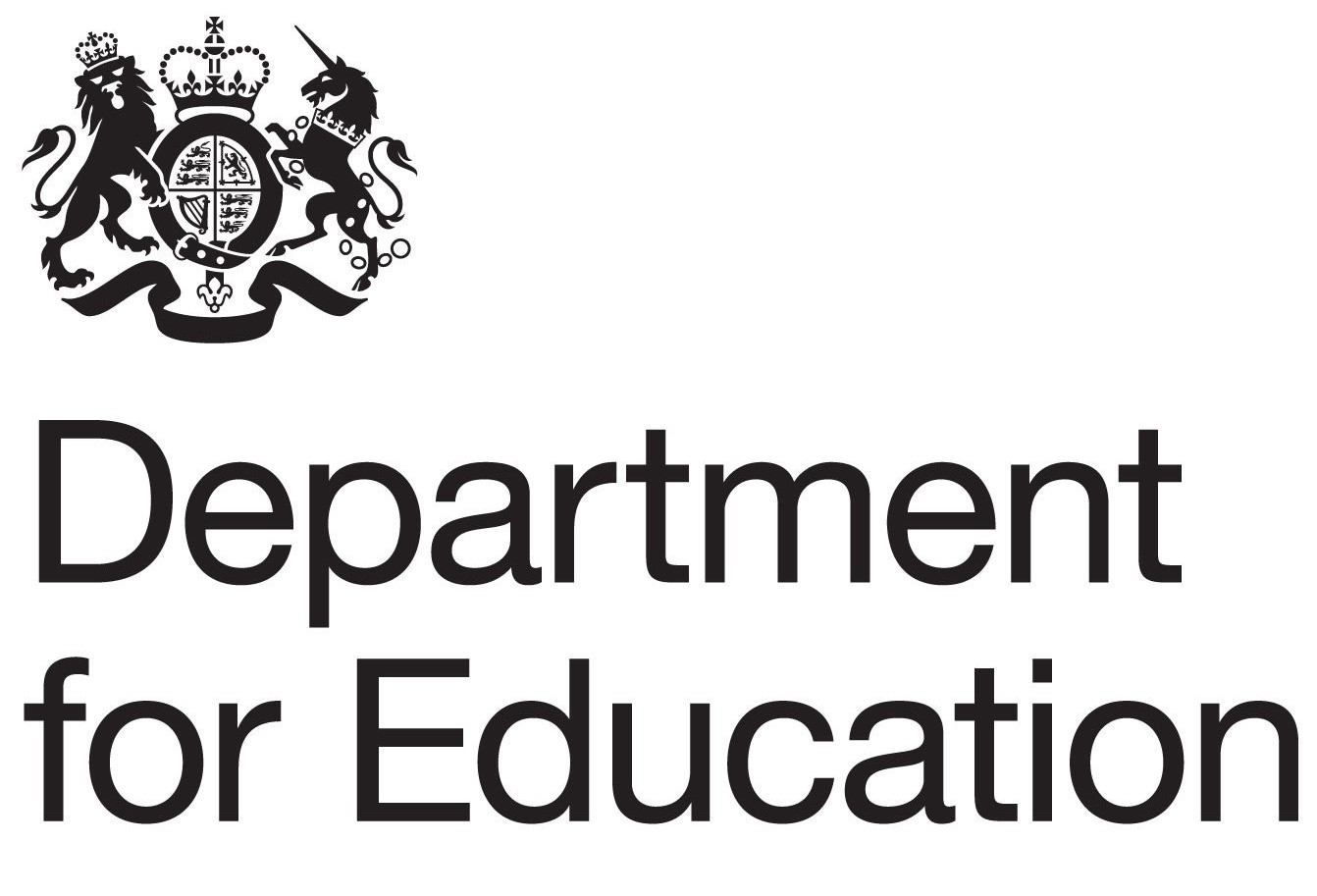
Teaching the National Curriculum of England in Indonesia
The National Curriculum of England is the set of standards used to through England & Wales to ensure that all children are learning the same things as they move through schooling. The curriculum is set out in 4 required key stages for students ages 5 – 16. With an optional key stage 5 for ages 17 & 18 (years/grades 12 & 13). Students attending international schools almost always include key stage 5, also known as college, in the British sense of the word.
The curriculum defines the fundamental aspects of learning including the subjects to be taught, the knowledge, skills, and development with each subject. The level of ability students are expected to achieve in the subject, and lastly how students will be assessed. With that framework, schools are free to plan and organize lessons as they see fit.
Accreditation for the National Curriculum of England comes directly from the UK Department of Education and includes a scheme for overseas schools, called BSO’s (British Schools Overseas) to verify they meet the standards of UK schools.
Why consider teaching in Indonesia?
Indonesia has a huge and every-growing education sector with plenty of teaching opportunities for teachers of all subjects and grade levels. The education sector has a long way to go, but the more high-quality foreign instructors head over to Indonesia to teach, the faster the industry will improve and grow in a positive way. If you want to truly make a difference in students’ and parents’ lives, teaching in Indonesia is the way to go!
Plus, there are thousands of areas to explore in and around Indonesia that are cheap and easy to get to. You’ll never have an excuse to be bored here! If you choose to teach in Jakarta or a similar city, you’ll find that there’s an energetic feeling that emanates from it at all times of the day. There will be plenty of other foreign teachers around in the major cities in Indonesia, and you’ll also run into locals all over the place that you can befriend and learn from!
Where in Indonesia can I teach?
Many of the teaching opportunities you’ll find in Indonesia are located in Jakarta, Surabaya, Yogyakarta, Bali, and Bandung. You can see on the map that Indonesia is made up of multiple islands, and you’ll find more schools on the bigger islands. You can learn a bit more about teaching in Indonesia below!
Jakarta is the capital of Indonesia, and it sits on the northwestern coast of the island of Java. It’s a hugely popular teaching destination for foreigners due to its size, location, and huge shopping malls. Jakarta has a population of almost 11 million people, and you’ll find many international restaurants and museums there.
There are many schools located across the islands of Indonesia, but the most opportunities for foreign teachers can be found in Jakarta.
Surabaya is a port city on the eastern coast of the island of Java – the same island where you’ll find Jakarta. Surabaya is filled with modern buildings and skyscrapers, as well as older architecture and historic landmarks from centuries past. There are some very interesting factories, monuments, and mountains for you to explore and learn about.
Yogyakarta can be found on the island of Java towards the southern half. It’s well-known for its cultural heritage and traditional arts. Here, you’ll find the Sultan’s Palace, many open-air pavilions that host incredible events, and other stunning sites such as Puncak Becici, Pinus Pengger, and Jurang Tembelan.
Bali is incredibly well-known around the world for its lush volcanic mountains, breathtaking rice paddies, stunning beaches, and picturesque coral reefs. Around Bali, you’ll find resort areas, bars, restaurants, and anything else you can think of! Bali is a great place to choose to teach if you want to live in an exciting, beautiful city.
Bandung is the capital of West Java province in Indonesia. It’s a lively university town that sports relatively cool tropical weather year-round. Bandung is also known for its shopping areas – you’ll find outlets and places to wander around all over here.
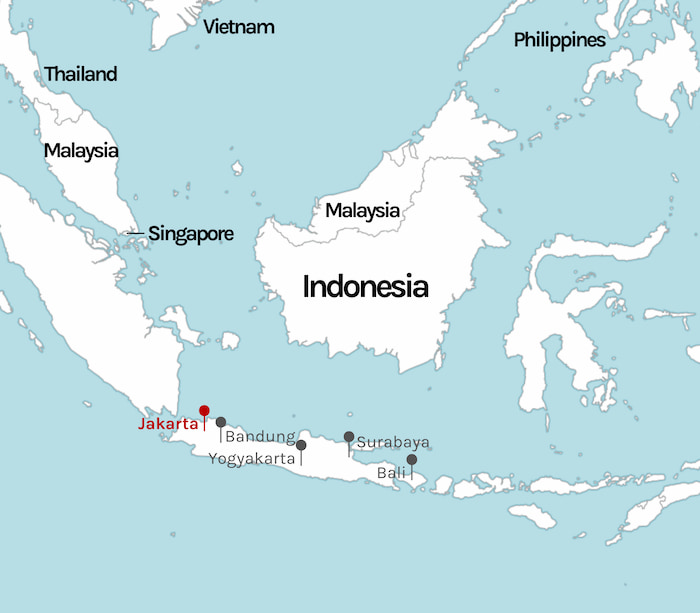
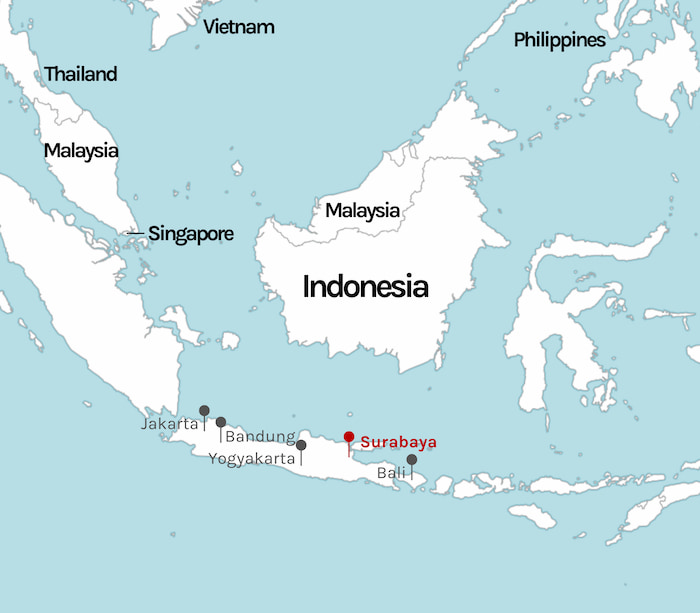
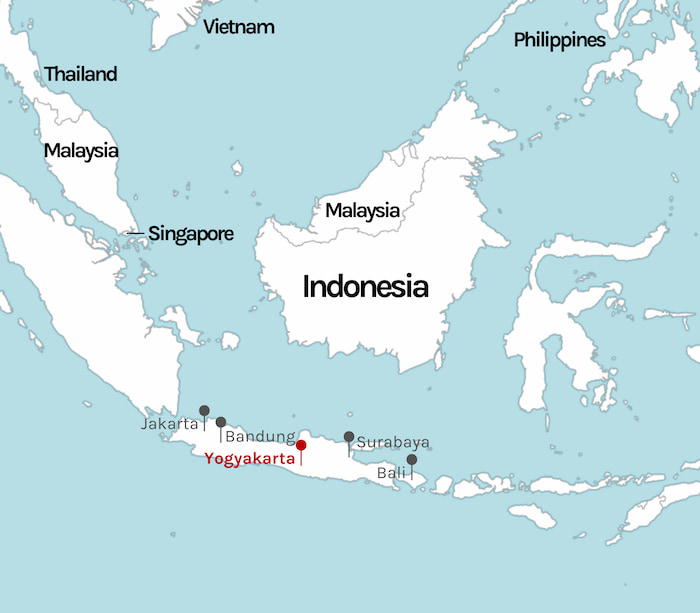
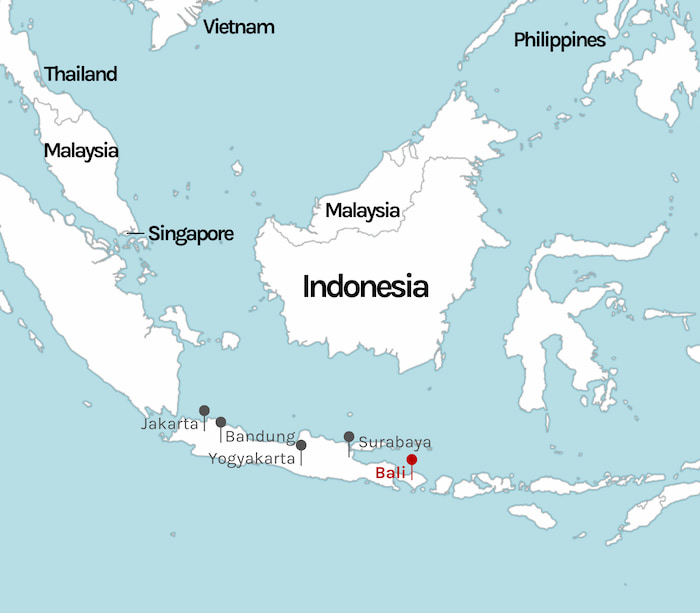
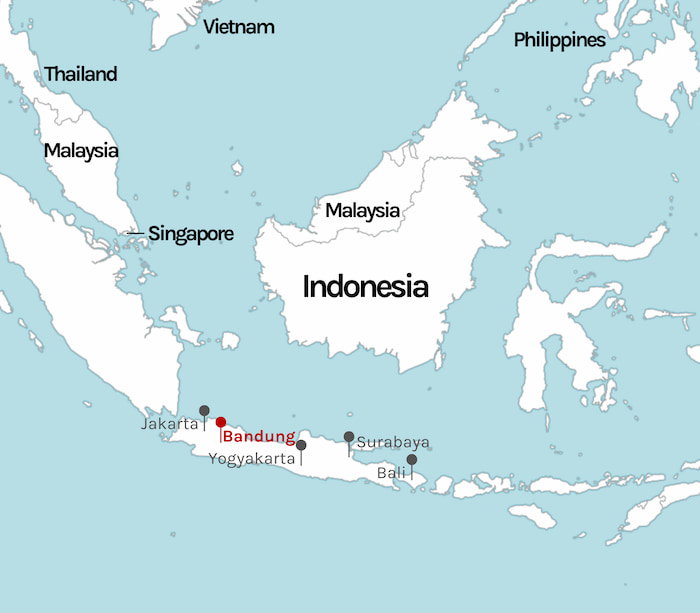
Types of schools in Indonesia
There are many different types of schools to choose to work at across the islands that make up Indonesia, so you’ll want to do a little research on each one to figure out which type will best suit your lifestyle, salary, and time-off needs. There are often trade-offs that you will need to consider with each type of school. For example, if you want a higher salary, you’ll need to work more hours, so maybe you should consider an international school. However, if you want more time off, you may want to work at a university where you’ll have less working hours and a lower salary.
Training centers in Indonesia
Some foreign English teachers in Indonesia choose to teach at training centers. These schools are attended by kids or adults in the evenings and weekends specifically for English language instruction.
Positions at training centers are often easiest to secure as there is a high demand for these classes, and they hire year-round. Each center has its own specialized curriculum, and they typically provide teaching and training materials which means your planning and preparation time is minimized.
Preschools and kindergartens in Indonesia
The name says it all, the children in these institutions are 18 months to 6 years old. Teaching English in a kindergarten or preschool is a very common job in Indonesia especially in cities with a large population like Jakarta.
Teachers can expect a friendly working environment and an Indonesian teaching assistant in the classroom with them. There will be plenty of fun teaching materials available and little time is needed for preparation. Classes typically have 8-20 young learners and are between 20-40 minutes long.
International schools in Indonesia
These schools are where professional expats and wealthy locals send their children. Tuition for the students is high and enrollment is very competitive. This means that teacher remuneration is fantastic (especially if you have children) but these jobs will often require a teaching license and graduate degree.
Classes are held on the traditional two-semester schedule and almost all classes are taught in English. Most international schools will follow either the International Baccalaureate (IB) or the foreign (A-level/AP/etc.) curriculum, so teachers with experience and familiarity with these curriculums are preferred.
Schedule and start dates
K-12
Fall starts in August/September
Spring starts in March
Training Schools
Rolling start dates year-round
Start anytime!
K-12 schools work on a similar schedule as western countries with the fall semester starting in late August or early September and the spring semester starting around March. For fall positions, we suggest applying 4-5 months in advance and 2-3 months in advance for spring. In addition, Indonesia has options in training schools, which hire new teachers every month! No matter your schedule, we’ll be able to help find the best teaching opportunities available.
Salary and benefits while teaching English in Indonesia
There are many different types of schools to choose to work at in Indonesia, so you’ll want to do a little research on each one to figure out which type will best suit your needs and expectations. Each type of school has pros and cons no matter where in the world they’re located. Be sure to do your research about that type of school in Indonesia to ensure that you’re prepared for the schedule and salary.
Here’s how experience & qualifications can affect your earning potential:
Bachelor’s Degree:
This is a minimum requirement for teachers in Indonesia. Possessing this should set your starting salary at no less than $850 USD/month at a training school or $2,500 USD/month if you teach at a preschool, kindergarten, or international school. The latter schools will have additional required qualifications.
TEFL/TESOL certification or 1-year teaching experience:
This is the minimum requirement for Teaching Nomad as well as for Indonesia. Unless you possess a proper government teaching license, you will need a TEFL certification. If you need a teaching certification, click here for information on getting TEFL certified!
Teaching license and/or degree in education:
If you are licensed to teach in your own country, the sky is the limit in Indonesia. Holding one of these credentials will generally get you a salary in the range of $2,500 – $3,700 USD/month. A very comfortable wage in Indonesia.
Post-graduate degree:
The better educated you are, the more jobs there are available. You will likely earn a higher salary and have more positions to choose from.
Location:
Just like in any other country, your pay will be higher in the bigger cities around Indonesia. However, the cost of living also goes up in these cities, which is something to keep in mind.
Hours:
As you can imagine, the number of hours you work will affect your salary. Training schools generally require you to teach 20 hours, and typically pay 850+ USD/month. At kindergartens and preschools, you can expect a similar number of teaching hours. Though the teaching hours at international schools are not much different, they require more class preparation time and are stricter on office hours.
Benefits:
Most, if not all schools provide teachers with housing or an allowance for housing. If you need to pay for accommodation yourself, expect a range of $250 – $500 USD/month depending on location and required bedrooms. Other common benefits include annual airfare reimbursement, health/medical insurance, and in some cases, annual bonuses.
Document Legalization
In order to get a visa to teach in Indonesia, you might nee to get some of your teaching documents legalized by the Indonesian Embassy. This can be a difficult process on your own, so we now offer a service that gets it done for you, hassle-free!
What our teachers are saying
I’d highly recommend Teaching nomad because it is a reputable, international agency that has teaching opportunities all over the world. Their website is easy to use, the consultants are attentive and help you throughout the process. I’d choose them all over again.
I was helped by Moira, and the support provided to me was second to none. I’m super grateful for the support. Finding a job during this difficult period would have been a challenge on my own, however, the assistance from Teaching Nomad made the process much easier. They also offered continuous support once I started working. They have been absolutely fantastic.
TN helped me from the very start, which for me was trying to decide which TEFL certification to go with. From there my consultant, Moira, helped me with the documents I needed, gave me resume tips, sent off my profile to various schools even before my certification was complete, and gave me interview tips when the schools wanted to meet me. Thanks to the help Moira and Teaching Nomad provided, I have just signed a contract with a higher than normal salary for a first-time teacher. Now they are helping me out with authenticating my documents and my application for a visa!
Blogs about teaching in Indonesia
Learn all about teaching, traveling, and living abroad!
No Results Found
The page you requested could not be found. Try refining your search, or use the navigation above to locate the post.
Ready to get started or still have questions?
Register now to speak with a personal placement consultant!


